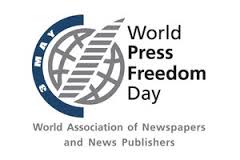
The work that journalists do is often dangerous and difficult. Unfortunately, 2013 was one of the most dangerous years for the profession across the world, with 70 journalists killed. Many of these were caught in the cross-fire of armed hostilities. They had been trying in exceedingly difficult circumstances to tell the stories of some of the world’s most appalling conflicts. 14 more have been killed in similar circumstances so far this year. But the threat to journalists and their work is not limited to being caught up in instability. Last year, 211 of whom we know were being held in prisons across the globe. Many of those were there because of criticism they had published of their own governments.
This year’s theme for #WPFD is “Media Freedom for a Better Future: Shaping the Post-2015 Development Agenda”. It focuses on the importance of a free press in developing good governance and transparency. Journalists, together with civil society and opposition parties, have a crucial role to play in challenging government policy. Without this it is hard for countries to promote development in an inclusive and accountable way, one which is constantly taking account of new ideas. There might be a strong appetite, particularly in development-focused states, for this type of challenge on economic and social policy. But it is also needed in areas such as good governance; human rights; and even the good and bad things about a country’s political system – that is, if development gains are to be sustainable and equitable. Governments need to have the confidence to give journalists, bloggers and others the freedom to perform this function effectively – while maintaining the reasonable expectation that they will abide by the law, working in a responsible manner that will not incite hatred or violence.
Of course, the nature of journalism and ‘the journalist’ has changed dramatically in recent years. New technologies mean that journalism is no longer confined to print newspapers; the news is no longer exclusively made by professionals employed by media houses. The ordinary citizen, through the internet, and particularly social media, has as much opportunity to shape the news and perform this role of challenging government policy as the traditional journalist. This evolution has required governments across the world to rethink their definitions of what a journalist is, as well as considering how they regulate the industry – in a way that doesn’t constrain the freedom of this rich new pool of thinkers to contribute to discussions about their countries’ future. You may be familiar with the recent and vigorous debate we have had in the UK about the way in which our (often boisterous!) press should be regulated in light of the phone hacking scandal which emerged a few years ago.
Given all of this, it was a shame to see that Ethiopia’s own approach to press freedom has again returned to the spotlight this week, with the arrest of a number of bloggers and journalists last weekend. We are following this closely – a legal process is underway which should be carried out in full accordance with Ethiopian law and the Constitution. If it becomes clear in this process that the individuals were simply challenging in some of the ways I have talked about above, we hope they will be released quickly and allowed to get on with their jobs.
I should also mention events unfolding in #Oromiya this week, which I have been following with great sadness. Details are continuing to emerge of exactly what has happened in universities and towns across the region, but it is clear that many students have been killed in clashes with the police. My thoughts are with the families and friends of all those affected. I am sure the Ethiopian authorities will want to conduct an immediate and thorough investigation – one which will ultimately lead to justice for all those caught up in these terrible events. I also hope the media here will report what has happened fully and impartially, respecting the fact of #WPFD.
